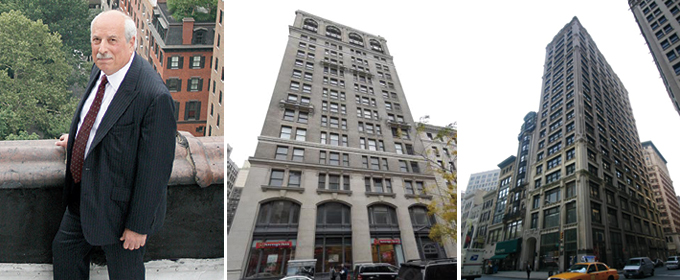
From left: Frank Ring, 251 Park Avenue South and 212 Fifth Avenue (building photo credits: PropertyShark)
Midtown-based property owner Joe Tabak is battling in court over a disputed contract to
buy a share in the neglected Ring family’s Manhattan real estate fortune for $112.4 million.
Tabak, through his Princeton Holdings, signed an agreement Feb. 24 with Michael
Ring, a co-owner of the properties, to pay $112.4 million in debt and equity for
a partial interest in 14 buildings, mostly in Midtown South near the Flatiron building, a
lawsuit filed May 31 in New York State Supreme Court shows. By April 15, Tabak had
put about $10 million in escrow, and confirmed in writing that he wanted to proceed with
the transaction, the papers say.
But Ring backed out of the deal, the lawsuit contends. Now, Tabak wants the
complicated joint venture deal — made up of five different parties — to go forward, and
in his petition, asked the court to order arbitration and issue a temporary restraining
order blocking any sale of the properties. On June 6, the judge agreed to the temporary
restraining order.
The men are dueling over properties with huge vacancies in the Midtown South
neighborhood that has the lowest vacancy rate in the city at 7.2 percent, compared with
Midtown at 8.2 percent and Downtown at 9.8 percent, making the buildings particularly
valuable if they can be improved and leased up, recent data from CB Richard Ellis
shows.
“They are generally pretty well located buildings that are in need of a lot of work,” Jon
Epstein, an investment sales broker with Grubb & Ellis, who was not involved with Ring
or Tabak, said. “They’ve been neglected. I’m not quite sure why. I’m not sure anyone
knows why.”
The buildings include the 223,500-square-foot 212 Fifth Avenue, at the corner of 26th Street, which is 37 percent vacant, and the 120,000-square-foot 251 Park Avenue South, at 20th Street, which is 25 percent vacant, court records and occupancy data from CoStar Group show. Other properties include 119 West 24th Street, which is 151,200 square feet and 25 percent vacant; 17 West 60th Street, which is 93,750 square feet and 23 percent vacant; and 31 Park Avenue South, which is 45,000 square feet and 44 percent vacant.
On Monday, Ring responded in court papers that one of the legal tactics taken by Tabak
to impede any property sales to a competing buyer — the filing of notices of pendency
on 10 properties — was not a legitimate action. Ring asked the judge to lift the notices,
court records show. Furthermore, the Ring response notes that the time period of the
agreement to buy the 14 buildings expired, and no deal was made.
“The exclusivity period contained in the letter agreement expired without the execution
of a definitive agreement, and [Ring] elected to terminate the letter agreement consistent
with his right,” Ring’s response says.
But Tabak sees it differently. He did put down the deposit and put that in writing.
“If [Tabak] elected in writing to proceed with the transaction and funded its portion of
a purchase price deposit, the agreement would become fully binding. In real estate
parlance, the agreement would ‘go hard,'” Tabak said in an affidavit filed May 31.
But Stephen Meister, a partner at Meister Seelig & Fein, who is representing Ring, had
an answer for that. He said in an email: “No, the contract is not enforceable. Because
they are not telling the truth. Not a dollar went hard. The deposit was to be governed by
the terms of the definitive docs, which were never agreed to or signed,” he said.
A representative for Tabak and Janice Mac Avoy, a partner with law firm Fried,
Frank, Harris, Shriver & Jacobson, who is representing Tabak, both declined to
comment.
The next hearing date is June 27, in the courtroom of Justice Bernard Fried.
Under the deal, Tabak would provide $112.4 million in debt and equity to a joint venture,
and in exchange Michael Ring would put in his 50 percent interest in the 14 properties.
Adding to the complexity is that Michael Ring currently owns a 50 percent share in those
buildings as a tenant-in-common structure with his brother Frank Ring, who owns the
other 50 percent.
The proposed deal structure between Princeton and Ring involves the creation of a joint
venture entity, which includes, in addition to Tabak and Michael, the Midtown investment
firm the Broadsmoore Group, multi-family investors the Bluestone Group and DiRing
LLC.
Michael is chairman of Broadsmoore, while his son David is president of the company.
Calls to Princeton Holdings and Broadsmoore were not immediately returned.